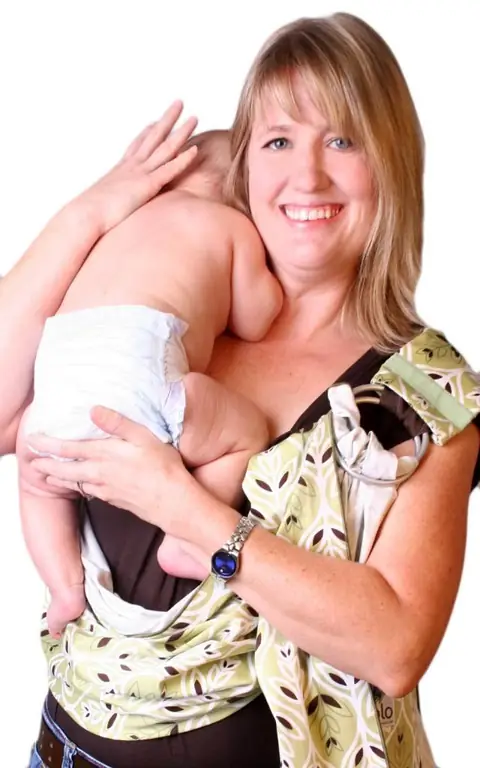2026 Author: Priscilla Miln | miln@babymagazinclub.com. Last modified: 2025-01-22 17:55:18
Caring for a newborn is hard mental and physical work. Almost every young mother faces one or another problem when a long-awaited baby is born. What should be the care of a newborn in the first month of life and beyond?
In the hospital
First, mother and child are in the hospital. Here, a woman can be helped with the basic manipulations for caring for a newborn on the first day of life by medical staff. But still, the mother bears full responsibility.
In the maternity hospital, a woman is still gaining strength, it is not so easy for her to take care of a newborn. She is getting used to breastfeeding and a new routine for her.
It is worth noting that in the early days the baby sleeps most of the time. Therefore, a woman should spend this period on sleep as much as possible. When the baby falls asleep, she also needs to go to bed, because then such an opportunity may not be due to domestic problems.
First days at home
After discharge from the hospital, all actions for the care of a newborn fall on the shoulders of the parents. They have to get used to the new rhythmlife. Initially, you need to prepare a "corner" for the baby.
Be sure to install a bed with sides, a changing table and a chest of drawers for the child's things in the room. It is better if the baby is in the same room with the parents until the age of one.
Thus, caring for a newborn in the first days will be several times easier at once. Night feedings will not become super heavy due to moving from room to room. It is necessary to provide a lamp. It will come in handy during the night awakenings of the baby.
It is desirable that everyday problems and concerns be divided between the spouses in half, so that the woman has time for a good rest. If this is not possible, then you can involve grandmothers or other relatives and friends in this case.
Swaddle
Is it relevant now? Even 15-20 years ago, swaddling was a mandatory manipulation in the care of a newborn. A month or more in this way, the baby was fixed in one position and slept peacefully.

Now more and more often children are given complete freedom of movement from the first days. Pediatricians also do not insist on this manipulation. But particularly restless babies can be swaddled, and sometimes even necessary.
Until 5-6 months, the baby makes involuntary movements and wakes himself up. To prevent this from happening, you can fix it with a diaper. Sometimes they use this method only to the chest or vice versa. It turns out that the legs of a newborn or his hands are swaddled.
But more and more mothers do not use this method and children simply sleep inlittle men. Thus, the baby gradually gets used to his sensations and movements, which cease to interfere with him.
Belly button treatment
Now modern devices are used in maternity hospitals to fix part of the umbilical cord. For this, special plastic clothespins are used. The baby is discharged home with the umbilical cord still intact.
In the first days, the navel is treated with brilliant green. After separating the clothespin with the remains of the umbilical cord, care will change somewhat. During this period, until complete healing, hydrogen peroxide must be applied before treatment with brilliant green.
This manipulation is done carefully, using a cotton swab. Then, after drying, green paint is also applied in a small amount. Such care for a newborn baby should be done several times a day and especially carefully after bathing.
These manipulations will need to be done until the umbilical wound is completely healed. This will be reported at a scheduled examination by a pediatrician who monitors the baby.
Breastfeeding
According to all WHO recommendations, it is advisable for a baby to eat mother's milk up to one and a half years. Breastfeeding is now supported from the first minutes of a baby's life.
Even before the cord is cut, the baby is placed on the mother's breast in the delivery room. Thus, the first drops of colostrum will provide good immunity to the newborn.

According to the new standards, the baby should be breastfed on demand, and not by the hour, as was the case before. Thus, the flow of milk becomes larger, as a resultit is enough for a newborn.
But there are times when the baby "hangs" around the clock on the mother's chest. Then it is better to keep the time frame, otherwise the whole day the woman will be busy only with feeding.
Artificial feeding
Caring for a newborn baby can be a bit more difficult if breastfeeding has failed. In this case, it is necessary to switch to artificial infant formula.
Selection should be based on the he alth characteristics of a particular baby and the solvency of the parents. Unfortunately, now quality mixtures are very expensive.

The choice of nutrition should be discussed with the pediatrician. He will tell you the best option for quality and price. If the baby has a rash or severe colic after using a particular mixture, then it needs to be replaced.
It is also very important to make responsible food choices for small babies. For them, a special high-calorie mixture is on sale. It is worth remembering that complementary foods are introduced from 6-9 months, so the amount of the mixture is calculated taking into account this condition.
Bathing
In the first days of staying at home, it is difficult for a mother to navigate the regimen and decide on the rules for caring for a newborn. Bathing is best done a few days after the rest of the umbilical cord falls off with a clothespin.
For this manipulation, it is better to use a baby bath first. Bathing requires warm water. Previously, it was believed that it should be boiled. Modern pediatricians do not advise doing this andbother yourself with unnecessary unnecessary actions.

The water temperature is regulated by a special thermometer and should be 37-390. Even 10-20 years ago, decoctions of various herbs were used for bathing. Now mom can add them to the bath if she wants, but with extra care so that the baby does not have an allergic reaction.
When bathing, use baby soap without additives. It is advisable to hold the head of the newborn in the palm of your hand so that water does not get into the ears. In the first months of life, bathing should be done every day if possible, so that the baby's skin is cleansed and the body relaxes before going to bed.
Do I need a pacifier?
This question is puzzled by almost every young mother. If the baby behaves calmly and does not require too much attention, then this accessory can easily be dispensed with.
If the child often screams and cannot stay even for a minute without his mother's breast, then it is better to offer him a pacifier. In this way, he will satisfy his sucking reflex and give his parents the opportunity to do their own thing.

It is worth noting that the main thing is to wean the baby from the pacifier in time, so that in the future he will not have problems with bite. It is better to do this by 6-8 months.
Hygiene procedures
Every morning after waking up, a mother must perform certain actions to care for a newborn in the first month of life. These activities include:
- ear and nose cleaning;
- treatment of skincreases;
- diaper skin care.
To perform these actions, you should familiarize yourself with some rules. First of all, you can not clean the ears and nose of a newborn with cotton swabs. They can damage delicate skin and internal organs of hearing and smell.
Special sticks with limiters are provided for these purposes. Better yet, make cotton flagella yourself, which will bend and cannot harm the baby.
Before each diaper change, it is necessary to wash the baby up to the waist and apply special products for newborns to the skin in this area. In this way, diaper rash on the baby's skin will be avoided.
Colic
Many parents face problems with tummy pains in babies. A sudden cry that is difficult to stop in a child may be associated with colic.
They occur in many children due to the unformed intestinal microflora. Not all newborns experience colic, but those who are "lucky" provide "stormy" days and nights for their parents.

To avoid such troubles, it is advisable for mom to follow a special diet. Now it is not very strict, as it was several decades ago. Pediatricians have proven that many previously prohibited foods do not have a negative effect on the baby. But still a woman should avoid certain foods:
- legumes;
- cabbage;
- alcoholic and carbonated drinks;
- too fried dishes;
- a lot of flouritems;
- lots of chocolate.
These foods can cause bloating and allergic reactions in your baby.
If colic "didn't pass by" the baby, then you can use pharmacy remedies for them. Special preparations will need to be given to the child before each feeding. Scientists have proven that they are completely safe for young children.
In moments of colic, you can also attach a warm diaper to the baby's tummy. In extreme and rare cases, the use of a gas outlet tube is allowed. In no case should you use "grandmother's" methods for these purposes - thermometers and cotton swabs.
Walks
If the baby was born in the warm season, then the first exit to the street is allowed immediately after discharge from the hospital. You can walk daily, with a gradual increase in the time spent in the fresh air.
Caring for a newborn in the first months necessarily includes being outside. Thus, the child receives the necessary amount of vitamin D from sunlight.
And also the immunity is strengthened and the nervous system of the child relaxes in the fresh air. It is worth avoiding walks in especially hot weather so that the newborn does not get heat stroke. It is also not recommended to be under open sunlight.
It is better to take walks in the shade or in the evening. In the cold season, you also need to go outside with the newborn. On frosty days, the first walks should start at 15 minutes with a daily increase in time.
If the house has a balcony, then in the first monthlife can be done by walking on it. In winter, you need to be in the fresh air with a newborn up to 2 hours, but subject to a temperature regime of at least - 100.
Features of newborn care in the first months
A small child in the family forces parents to rebuild their lives completely. Often you have to sacrifice your interests for the sake of heirs. But do not forget that no one has canceled personal life. Members of the family where the child was born should pay attention to themselves and not forget about their relationship.
It is necessary to leave time for a woman to rest so that a sufficient amount of milk is produced during breastfeeding. And also parents are obliged to carefully monitor the child and his behavior.

When a newborn is a month old, the development and care of him must comply with the standards indicated by the pediatrician. The child should stop looking at large objects a little and begin to babble.
A baby in the first month of life is gaining from 500 to 1000 g according to the schedule. If the figures are less, then you need to contact a specialist to adjust the feeding. The doctor may refer you for additional examinations to find out the reasons for underweight.
And also in this period, the child must undergo the necessary narrow specialists who can detect congenital problems in time and help in their treatment. From the first month, children who are artificially fed increase the daily dose of the mixture. It can be seen in the table above and adjustedquantity.
There is no need to be afraid or embarrassed to ask questions to the pediatrician at the scheduled visit, which must be observed monthly. Thus, problems can be detected in time and solved. And you should also remember that caring for a newborn girl in the first months does not differ from the general rules.
Recommended:
Caring for a newborn baby in the first month of life: basic rules

Often, the expectation of a baby becomes a joyful event for all family members. A mother who already has children behaves more balanced and calm during pregnancy than a woman who is pregnant for the first time. Usually this condition is associated with a lack of experience and fear of not being able to cope with a tiny creature. We will help young mothers gain confidence and talk about caring for a newborn baby in the first month of life
How to swaddle a newborn baby - features and recommendations

In today's society there is a disagreement about whether it is necessary to swaddle a newborn baby. Young mothers are divided into those who prefer traditional swaddling, and those who consider it a relic of the past. Let's try to figure it out
How to hold a baby: rules for caring for a baby, necessary knowledge and skills, tips

The birth of a child is a very touching and crucial moment. If this is the first child for newly-made parents, then even in the maternity hospital they will have many questions related to caring for the newborn. The vast majority of parents admit that they do not know how to hold the child in their arms until the baby gets stronger, that is, in the first 2-3 months. But by learning a few simple rules and recommendations for caring for a newborn, you can enjoy positive moments without fear
Do I need to boil water for bathing a newborn: rules for bathing a newborn at home, water sterilization, adding decoctions, folk recipes and recommendations from pediatricians

Bathing a small child is not only one of the ways to keep the body clean, but also one of the ways to stimulate breathing, blood circulation in the body. Many parents ask themselves questions: is it necessary to boil water for bathing a newborn, how to choose the right temperature and where to start the water procedure
Rules for caring for the umbilical wound of a newborn

The first few weeks after the birth of a newborn baby is a difficult time for all parents. Especially if the firstborn was born. Newly minted moms and dads are worried about a lot of questions regarding the rules for the care and hygiene of crumbs

